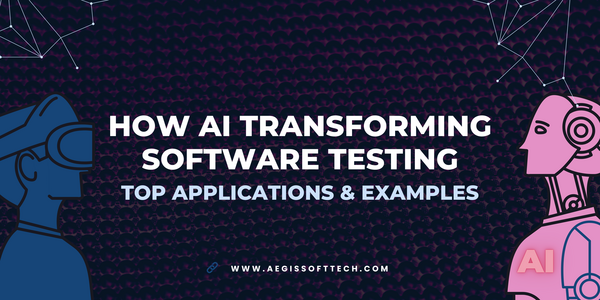The role of artificial intelligence (AI) in the evolution of different sectors over time has become a game changer and, no wonder, software testing got it too. While the traditional software testing techniques are typically slow, error-prone, and behind the fast pace of present-day software development, the technology presented here is the opposite. This AI technology is transforming the software field and engaging new advanced AI software testing tools that boast better accuracy, wider coverage, and higher efficiency. Here, we will show you how artificial intelligence is changing the game of software testing and give some of its top applications as illustrations.
The Evolution of Software Testing
The process of software testing has continually gone through significant transformations. At the first stage of software quality assurance, manual testing was widely used and testers would run test scenarios aimed at detecting bugs. Though that method is reliable, on the other hand, it is slow and it is challenging to implement it in complex software systems at scale. According to this, to resolve those problems, automated testing was created and the person didn't take part in the testing manually as scripts executed tests automatically, and error reduction and efficiency were increased.
But, according to automated testing, it has also its limitations. Writing test scripts can be complicated, and maintenance is needed as software updates are taking place. This is the place where AI takes place, giving expert features to elevate automation testing, adapt to changes, and even predict defects.
How AI is Revolutionizing Software Testing
AI is making software testing changes in many respects involving speed, accuracy, and intelligence. Here are some key areas where AI is making a significant impact:
Test Case Generation and Prioritization
One of the most time(time)-consuming activities in software testing is constructing test cases. AI can handle this by examining the code, requirements, as well as the user's actions, and then generating the test cases based on the results. Furthermore, AI algorithms can rank test cases based on risk level, code changes, and user impact enabling testers to spend most of their time tackling the more important issues.
Automated Test Maintenance
Since the software is changing daily, test scripts are often modified to stay current. AI can make necessary scripting changes as and when the code changes take place thus minimizing the overhead for keeping test cases up-to-date. This guarantees that automated tests are robust and thus reliable over time.
Defect Prediction and Root Cause Analysis
AI will take into account historical data, codeset changes, and other factors to determine where the defects are most likely to happen. Due to this predictive feature, testers can prioritize their work on high-risk parts, which increases production efficiency. Furthermore, AI can root cause analysis, locating main issues and similarities in case of defects to help developers address the foundation problems.
Natural Language Processing (NLP) for Test Automation
The Natural Language Processing (NLP) function allows AI to comprehend and process human language. Software testing company allows for the usage of NLP, where test cases can be created from natural language descriptions; that is, testers do not need to have scripting knowledge to write an automated test. This function also allows for the automation of exploratory tests with AI having the ability to simulate user interactions and defect findings based on natural language commands.
AI-Driven Exploratory Testing
Exploratory testing involves testers omitting specific test cases, getting acquainted with the application, and looking for unexpected behavior and bugs. AI could be used as a tool to improve this process via the application of machine learning that analyzes user activity and generates recommendations for exploratory testing. This way is a good tool to find out the unknown drawbacks that a traditional way of testing is not able to detect.
Testing Services Company India
In India, AI is adopted by their software test industry so that it becomes advanced and remains competitive in the global market. Companies offering software testing services are becoming more kit and kienge than ever before, capable of building unique and relevant ideas for customers. By implementing AI-driven test automation, defect prediction, and test case generation, these companies will be able to deliver faster and more reliable results.
Major AI testing services organizations in India are directing their resources towards AI research and development, which results in AI-driven testing frameworks and tools. Through this innovation, Indian companies are now in a place to compete on the global stage and can deliver quality testing services to clients all around the world.
Prominent Examples of AI in Software Testing
To understand how AI is applied in software testing, let's explore some prominent examples:
1. Test Automation Frameworks
AI-driven test automation tools like Applitools and Testim leverage AI in developing, running, and maintaining automated tests. They use AI to detect changes in the user interface by modifying the test cases and rejecting false positives. Thus, they increase the accuracy level of the automated testing.
2. Defect Prediction Tools
AI-based tools such as SonarQube and CodeScene focus on predicting defects by analyzing the code and identifying sections of code with a higher risk of defects. The tools are capable of assessing possible faults based on code complexity, code changes, and history data to inform the testers in which areas there are high-risk possibilities.
3. AI-Driven Exploratory Testing Tools
The use of Testim and Mabl by AI, which improves ad-hoc testing, demonstrates this application. They can imitate user interactions, identify unnatural behavior, and propose test scenarios based on AI-observed patterns. With this method, we eliminated the need for human intervention in the process and increased the test coverage.
4. Natural Language Processing for Test Case Generation
AI-based NLP tools like TestRigor and Sahi empower testers to generate test cases from natural language descriptions directly. The capability of test case creation becomes simpler with this feature, allowing testers to concentrate more on testing with less scripting.
5. Continuous Testing and Integration Tools
AI-driven continuous testing tools like Tricentis Tosca and SmartBear aptly complement the CI/CD pipelines by enabling automated testing at all stages of software development. These tools apply the AI functions to improve the performance of test execution so that the software is tested with thorough logic to guarantee smooth production.
Conclusion
Artificial intelligence (AI) is changing significantly how software testing is done, giving to the process speed, precision, and intelligence. Combining automated test generation and code sustaining to defect prediction and AI-driven exploratory testing transforms software testing. AI has become the key to success for many companies in India in the area of testing services as they use it not only to improve but also to provide innovative solutions to customers. As AI becomes more and more advanced, we can anticipate even more creative and groundbreaking developments in the world of software testing, enabling faster development cycles and therefore, higher-quality software.
FAQ
1. What is the main advantage of using AI in software testing?
AI speeds up the process and increases accuracy thus letting engineers focus on defect locating rather than manual efforts and slower speed of testing.
2. Can AI completely replace manual testers in software testing?
No, AI can replace human testers with the monotonous duties but human perception and creative abilities are still required.
3. How does AI in software testing help with test case maintenance?
AI can handle the automatic updating of the test scripts when there are code changes, thereby, reducing the time taken on manual script maintenance.
4. Which AI technologies are commonly used in software testing?
Machine learning, natural language processing (NLP), and data analytics are the best examples of AI utilized in AI-based testing software tools.
5. Are AI-driven testing tools suitable for all types of software projects?
AI-driven tools are most suitable for large-scale projects with complex test cases but may not be very helpful for simple or static projects.




